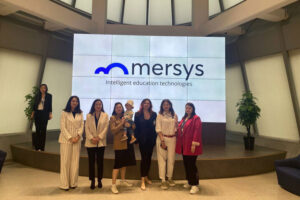NUR-SULTAN – The Astana Hub International Technopark of IT Startups in the Kazakh capital Nur-Sultan hosted the IT-Woman 1.0 Conference on female empowerment in IT on May 17 to address the issues of gender inequality in the IT sector, reports Forbes Kazakhstan.

IT-Woman 1.0 Conference. Photo credit: Forbes Kazakhstan
15 successful women in the IT industry shared their stories, knowledge, and experience to inspire and motivate women to explore the field.
The event was organized by Laura Tlepina, founder of Target Information Security firm working to provide operational sustainability for businesses. With 15 years of experience in the IT industry, she decided to gather women professionals to demonstrate that more women are now working in the IT sphere which has for many years been considered a man’s world.
“Women from different fields started texting me – flight attendants, teachers, accountants who wanted to try themselves in IT, but were not sure that they could cope. I realized that it was necessary to show brave Kazakh women who decided to retrain themselves and build a career in IT,” said Tlepina.
The data provided by the organizers of the conference show that women occupy around 20 percent of the total number of people employed in the domestic IT sector. The number is slowly but steadily growing throughout the country, particularly due to the active promotion of STEM education among girls.
Being a mother of two, Saltanat Mashirova, an advanced cyber security architect and engineer at Honeywell, a US-based software industrial company, has created a women’s community in the field of cybersecurity in Kazakhstan.
“Worldwide, only 24 percent of women work in the field of cybersecurity,” Mashirova noted. “By my own example, I want to say that women can achieve high results while remaining a loving mother and partner.”
Ekaterina Gottfried, lead recruiter at Qazdevelop, a Kazakh IT company specializing in the development of web and mobile applications, spoke about the importance of implementing a work schedule.
“An employee can stay in the office, choose a hybrid schedule – combine offline and online modes, and work remotely for a company anywhere in the world. It is critically important for a woman, especially one with a family, to be able to combine work and family obligations,” she said.
